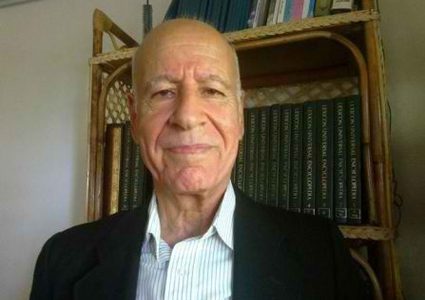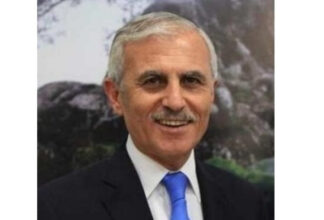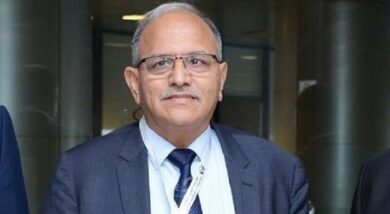Gaza Peace Council chief glorifies arms
شبكة الخامسة للأنباء - غزة

Author: Tawfiq Abu Shomer
I was reminded of my story with my Arabic teacher in middle school on the occasion of the assigned topic — the poets of the Mu’allaqat from the pre-Islamic era. The Arabic teacher wrote two lines by the poet Antarah ibn Shaddad on the board. The two lines carried two different themes: war and love. In the two lines Antarah wanted to flatter his beloved (Abla) while at the same time describing his legendary heroism in a battle fought with swords, spears, shields and horses; the battle left the hero Antarah bleeding. The Arabic teacher was one of Antarah ibn Shaddad’s greatest admirers. He used to tell us the poet’s story — how he protected the tribe from enemies thanks to his bodily strength and bravery — and he was fascinated by the way Antarah was freed from slavery, and by how harshly his society treated him because he was black. The teacher would repeat the dialogue between him and his master, the sheikh of the Abs tribe. When enemies raided the Abs tribe’s tents, his master said to him: “Kurr, Antarah — take up your sword and fight the enemies.” Antarah replied: “A slave does not do kurr; he only knows milking and churning.” His master then said: “Kurr as if you are free.” Antarah seized his sword and fought that day like a hero; the sheikh acknowledged him by lineage, and Antarah was no longer a slave but became a master in the Abs tribe! The teacher wrote Antarah’s two lines of poetry, which were:
I remembered you while the spears were quenching their thirst … from me, and the Indian ivories drip from my blood.
So I wished to kiss the swords because they … shone like the flash of your smiling mouth.
Our teacher elaborated at length on the two lines, especially on the expressions “spears quenching their thirst,” “they shone,” and “kissing the swords.” I was not convinced at the time that these two lines were appropriate for love poetry, because love is unpalatable in an age of killing, war and stabbing. I was embarrassed to object to my teacher and express my rejection of coupling love with killing and blood — they are opposites that do not meet. The teacher respected me and rewarded me, but I gathered courage and asked him politely: Are the two events compatible? Love needs flowers, calm and peace, not bloodshed!
At that point my teacher’s anger flared as if I had personally attacked him and touched Antarah ibn Shaddad whom he revered and loved! For the first time he scolded me harshly and mocked my question, saying: “Love in your time is different from love in the poet’s time. There is a difference between our present peaceful society, free of battles and wars — a society of flowers, lovers and romantics — and Antarah ibn Shaddad’s tribal society built on raids and war. In Antarah’s society love and heroism are inseparable!”
I tried to smile and nod to show my teacher that I had finally accepted his analysis, though I did not agree with it.
The reason I recalled this memory was last Monday, when I listened to U.S. President Donald Trump’s speech in the Knesset. As I listened I became convinced that Donald Trump belonged to the school of my Arabic teacher, even though he had never heard of that teacher, nor of Antarah ibn Shaddad and his famed mu’allaqa!
The truth I do not deny is that I support an agreement to halt the war in Gaza, and I back that initiative because it spares the blood of my people and fellow citizens. Yet when I listened to President Trump’s speech in the Knesset I realized that all political leaders are demagogues who mislead their listeners with deceptive speeches!
I believe, on that basis, that politicians are expert at misleading peoples and inventing labels that combine contradictory themes. I will not forget President Trump’s threats during his first term in 2017 when he sought to negotiate with Kim Jong Un, the North Korean leader, to bring peace to the Koreas and the world; he boasted before the meeting about his American missiles and said proudly of his missiles: “Nice, and New, and Smart.”
In that same speech he went on to boast about the capabilities of his military, especially in the field of weapons of mass destruction, and he looked toward Netanyahu as he boasted that Netanyahu had always requested weapons of mass destruction. Trump boasted that Israeli experts were skilled at using the lethal weapons that America possessed, and that he had not been stingy in giving them that deadly internationally prohibited weapon, so that he could, at the end of the day, be president (of the peace council in Gaza)!
He also said, after threatening the world with killer weapons: “I don’t like war because my personality is one of peace and I want to stop wars,” but then he forgot the Gaza peace council again and resumed boasting about the planes that bombed Iran’s nuclear reactors. He boasted that a hundred planes accompanied our huge fighters, and that each plane needed to refuel seven times in the air to bomb the reactors, and that he owns fifty aerial refueling stations that fuel his planes in flight so they can reach their goals.
Trump did not forget to boast that he ended eight wars in his auspicious tenure in just eight months, and he reiterated his theory when he said: “We will implement peace by force, and we possess weapons no one dreamed of owning, and I hope we do not have to use them!”
Trump is exactly like my teacher, the Arabic teacher, because they both mixed opposites — love and war, peace and strike. They both believe that mixing them produces peace and harmony!
Through their logic “force brings peace,” Trump is the president of the Gaza peace council! He said: “Israel triumphed by the force of arms, and thanks to our strength and the bravery of the Israel Army we will achieve victory!”
He did not forget to honor a general who sat among the guests, John Daniel Rizen, Chairman of the Joint Chiefs of Staff — not because he is a man of peace, or because he is a member of the peace council that leads it, or because he will serve as an engineer on Trump’s team to rebuild what American planes destroyed in Gaza, but because he was different from previous generals who asked Trump to give them three or four years to be able to eliminate ISIS. General John Rizen had promised Trump he would eliminate ISIS in three weeks only! This destructive “heroism” will bring peace — and so General John Rizen fulfilled his promise and prevailed in a short time!
What if President Trump had read Arabs’ passion for weaponry in their poetry? Would he have been able to match the Arabic poetic meter and change a line by the poet al-Mutanabbi who praised Sayf al-Dawla when he liberated the village of Hadath from the Roman army?
Al-Mutanabbi said describing Sayf al-Dawla’s army:
Khamees — his host marched east across the land and westward … and in the ear of Gemini from him a thunderous clamor.
Would Donald Trump have changed the word “Khamees” to the word “missile,” and said:
A missile — its march east across the land and westward its flash … and in the ear of Gemini from it a thunderous clamor.
And would he have changed the poet’s line where al-Mutanabbi said:
Whoever seeks glorious conquest — its keys are white: light sandals and swords.
To become Donald Trump’s line of poetry:
And whoever seeks a long rule — its keys are his white missiles, the light ones and the blades?!!



